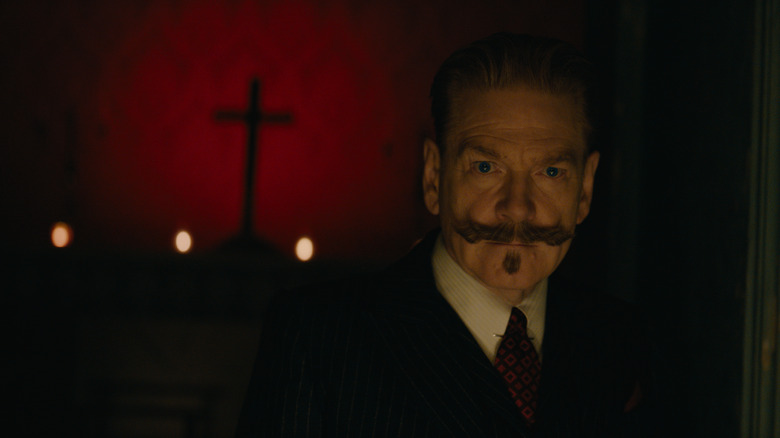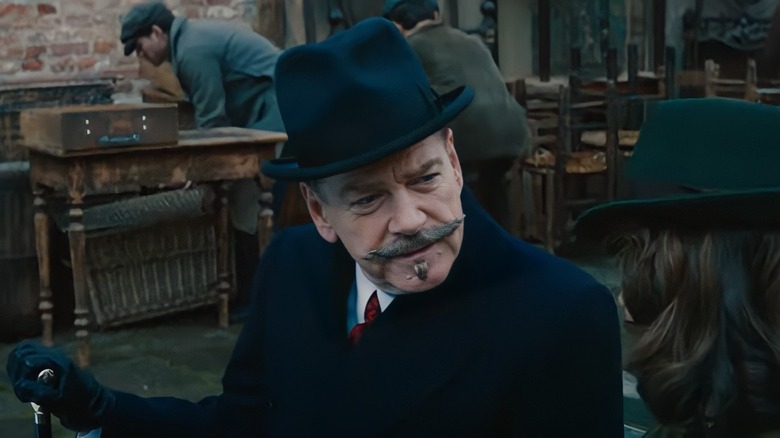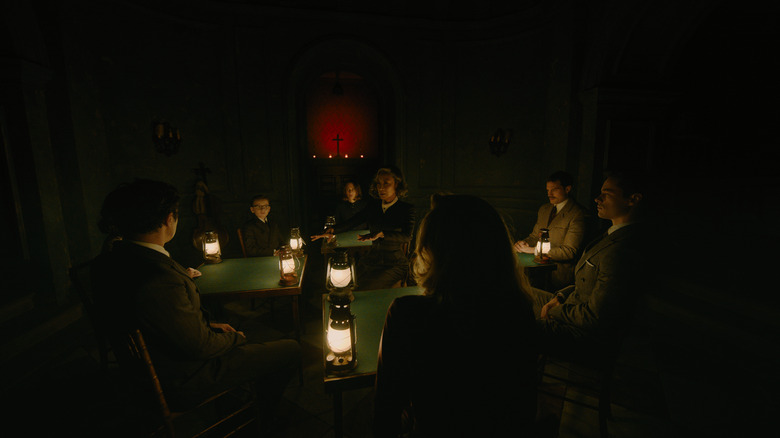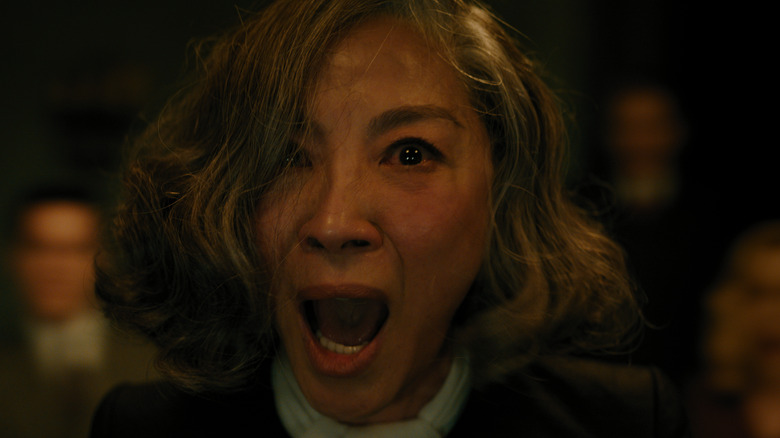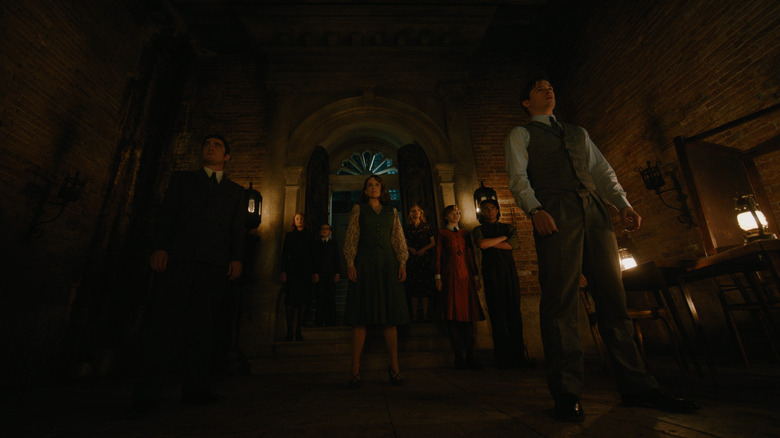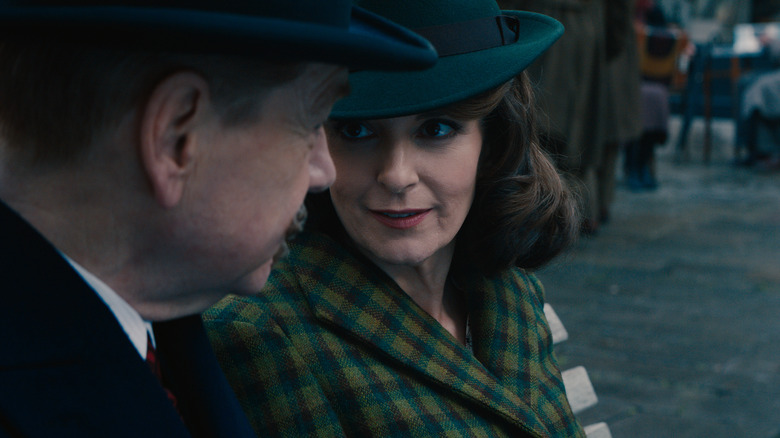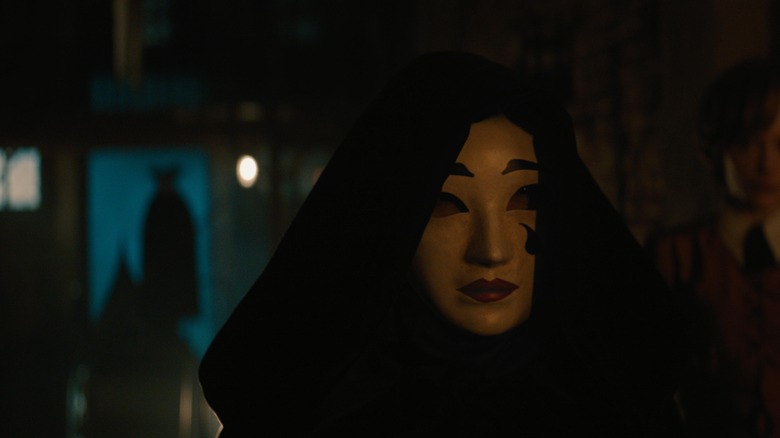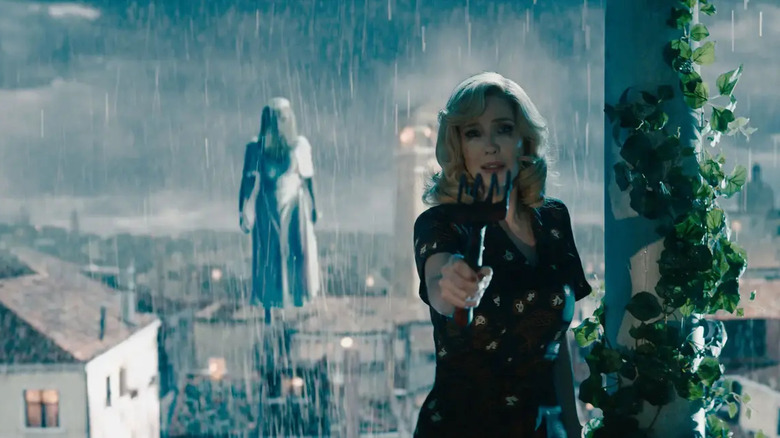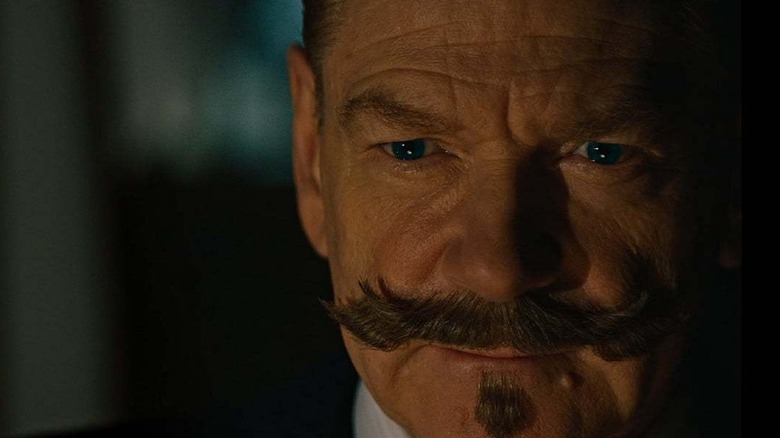A Haunting In Venice Ending Explained: Back From The Dead
Massive spoilers for "A Haunting in Venice" follow.
The adventures of Hercule Poirot — "probably the greatest detective in the world," as he once so humbly referred to himself — have been well documented by this point. Beginning with Agatha Christie's literary accounts of the detective's cases, the character continued to thrive beyond his creator's passing in 1976, with other authors concocting new mysteries for Poirot to solve.
Of course, Christie's Poirot output, stretching as it did from 1920-1975, was ripe for adaptation to other mediums, and indeed Poirot has turned up numerous times in everything from stage plays to radio dramas to television shows to, of course, the movies. By the time director/star Kenneth Branagh made his way to bringing Poirot back to the big screen on both sides of the camera, most of the best Poirot stories had already been adapted in one form or another.
Cleverly, Branagh and screenwriter Michael Green have treated their Poirot films as re-adaptations rather than remakes, taking creative liberties with the characters and plotting while retaining the spirit of the source material. In both prior Branagh/Green Poirot adventures, 2017's "Murder on the Orient Express" and 2022's "Death on the Nile," the filmmakers have taken the opportunity to further develop and comment on the character of Hercule Poirot, which is somewhat new territory.
What's certainly new(er) territory is Branagh and Green's latest Poirot adaptation, "A Haunting in Venice," which is a version of Christie's 1969 novel "Hallowe'en Party." Unlike "Orient Express" and "Nile," which had star-studded film versions made in the '70s, "Venice" is virgin territory for the big screen, and Branagh makes the most of it, bringing horror movie visuals and tropes to the whodunit in a big way while further exploring the flaws and foibles of the greatest detective in the world.
Who ya gonna call?
"A Haunting in Venice" takes place in Venice, Italy, the first of many differences from Christie's "Hallowe'en Party," which had been set in a country home in England. It's Halloween, 1947, a good ten years after the events of "Death on the Nile," and World War II has (mostly) come and gone. Living in a sort of self-imposed exile in Venice is Hercule Poirot (Branagh), who has become a much more haunted figure since we last saw him, starting awake after hearing gunshots. Are those sounds in his mind, or are they the encroaching harbingers of death that seem to haunt his life? Is Poirot reflecting on his past and all the murders he's been privy to? What other ghoulish things occurred during that ten-year gap?
Whatever the case may be, Poirot has made a point of retiring his services as a detective, going so far as to hire a bodyguard, Vitale Portfoglio (Riccardo Scamarcio), to keep strangers desperate for his help away from him. Making her way past this barrier is an old pal of Poirots, Ariadne Oliver (Tina Fey). As in "Hallowe'en Party," Ariadne is a successful writer of mystery novels (thus making her the closest analog to Christie herself appearing in the Poirot novels), having penned a series of adventures involving a fictional detective that is a thinly veiled version of Poirot, thereby increasing the real Poirot's notoriety and popularity.
Desperate to find a hook for another hit novel after a string of misses, Ariadne entices Poirot to join her at the palazzo of ex-Opera star Rowena Drake (Kelly Reilly), where an infamous medium, Joyce Reynolds (Michelle Yeoh), is scheduled to hold a seance in an attempt to contact Drake's recently deceased daughter, Alicia (Rowan Robinson) after the all-ages Halloween party. Goaded and intrigued, Poirot begrudgingly agrees to attend.
The afterlife at the afterparty
A pallor hangs over the Drake residence for more reasons than Alicia's untimely death, however. As a performer describes to all the children attending Drake's Halloween party, the palazzo was once a hospital for children, and during the darkest days of the Black Plague, many infected kids were sent to the bowels of the building and locked up, left to die by overwhelmed and irresponsible doctors and nurses. Hence, ever since those days, the palazzo is said to be haunted, with the children seeking revenge, especially against any medical professional who dares enter the building.
As the party winds down, Reynolds arrives with her assistants Desdemona and Nicholas Holland (Emma Laird and Ali Khan). Ariadne and others hope she's there to give definitive proof of life after death, while Poirot suspects she's a con artist looking to exploit the palazzo's notorious history. All the children are sent home, save one: the precocious Leopold Ferrier (Jude Hill), son of the Drake family doctor, Leslie (Jamie Dornan). The Ferriers, Rowena, Ariadne, Portfoglio and Poirot are joined by the Drakes' housekeeper, Olga (Camille Cottin), and Alicia's ex-fiance, Maxime (Kyle Allen), as Joyce and her assistants hold a seance in Alicia's bedroom. Poirot instantly exposes some faked "supernatural" shenanigans performed by Joyce's accomplices, only for the whole group to witness the medium seemingly contact the spirit of Alicia, who claims that one of the assembled is responsible for murdering her.
Bobbing for detectives
With Joyce's apparent channeling of Alicia's spirit having rattled the group, the attendees split up to gather their wits and thoughts. Poirot confronts Reynolds, insisting she's played a trick on them despite his having not deduced how yet. Reynolds admits to fabricating some supernatural behavior during her readings, but also explains how she discovered her psychic gifts while working as a nurse during the war. She claims that genuine communication with the beyond is her burden to bear, with herself acting as a conduit between the troubled dead and the bereaved, confused living. In this way, Poirot sees himself reflected in the medium, both of them essentially speaking for the dead in their own ways.
That reflection turns out to be seen by someone else, too, as Poirot dons a cape and hood costume similar to the one Joyce was wearing, taking a moment alone to indulge himself in bobbing for apples. Poirot is attacked and is almost murdered, were it not for the assailant abandoning their attack before the detective can drown. Shortly thereafter, Joyce Reynolds is plunged from a high floor, her body impaling itself onto a statue below, the hand of the statue plunging through her heart. While the other attendees instantly suspect the curse of the palazzo to be responsible, Poirot orders that the building be locked down, insisting that a very human murderer is present among them.
Suspects and ... the supernatural?
As per usual for a Poirot story, the detective interrogates each suspect individually and discovers that most everyone has a motive for murder. To wit: Olga is highly religious and thought Joyce was an emissary of evil, Dr. Ferrier is an alcoholic prone to fits of rage, Nicholas and Desdemona are refugees eager to escape to America (haunted themselves by the way 1944's "Meet Me in St. Louis" presented an ideal life they could aspire to), and Ariadne is perhaps too hungry to have a new story to adapt into a best-seller.
Yet Poirot realizes he's attempting to solve not one, but two murders; Joyce's and Alicia's, despite the latter having been ruled a suicide. Sure enough, there's suspicion there, too, as it's revealed that Portfoglio used to be a cop and was the one to discover Alicia's body when she died, Dr. Ferrier was Alicia's doctor and potentially misdiagnosed her suicidal depression, and Maxime was (according to Rowena) a gold-digging cad who used and abused Alicia terribly.
Despite all the confusion, Poirot is certain that a human being is behind all of this — until, that is, he begins hearing and seeing things around the palazzo that others do not. Soft whispers, mysterious shadows, and, troublingly, the presence of a young girl. It's here, in these visions, that Branagh most closely connects "A Haunting in Venice" to the trend of horror films involving a haunting, especially those where the spirit of a child or children are lingering in a spooky old location: everything from "The Innocents" to "Full Circle," "Audrey Rose" and "The Changeling," "The Others" and "The Devil's Backbone" can be seen in Branagh's use of an eerie-looking child roaming the halls of the palazzo (during a raging thunder and lightning storm, naturally).
Murder and betrayal
Poirot barely has time to worry about a threat from the beyond when he deduces that his supposed friends and allies have been conspiring against him. The detective puts together that Ariadne — with Portfoglio as her accomplice — has all along been arranging certain supposed supernatural happenings, both before and even after Joyce's murder. She's been worried about entering into a sort of forced retirement as her career has dwindled, and first thought of exploiting Joyce's reputation, then decided to ride on the notoriety of her murder, all with Poirot's hoped-for endorsement.
This revelation, of course, makes the detective suspect actual fowl play of the duo more than ever, his dismay at being deceived and betrayed cutting him deep as it did with Bouc (Tom Bateman) in "Nile" and, well, just about everyone in "Orient Express." However, before Poirot can build a case against the author and the bodyguard, yet another murder takes place: Dr. Ferrier is killed while inside a locked room to which Poirot holds the key, and there is no sign of a struggle. Once again, in the supposedly haunted palazzo, two medical professionals have died. Could it be ... the curse?
Will the real ghoul please stand up?
Such superstitious fears do not penetrate Hercule Poirot. At least, not that he'd admit to, as he's still privately suffering from those eerie hallucinations and visions. Thanks to the detective's "little grey cells" always being on high alert, however, it is the fact that he's having such visions at all which provides him with the final clue he needs to expose the killer.
Previously, one of the suspects seemed to elude almost all suspicion: Alicia's mother, Rowena, due to her obvious and honest grief over the loss of her daughter. Poirot explains how a plant grown on the palazzo's rooftop excretes a certain type of poison which resembles honey but actually induces hallucinations. From this, he puts together that Rowena, being overprotective and obsessed, drove Maxime away from Alicia and kept her daughter close by putting a controlled amount of the poison into Alicia's foods, keeping her home and sick. One night, Rowena left Alicia's side, and Olga, believing the poison was actually honey, gave an ailing Alicia too much of the substance. Rowena discovered that Alicia died in her sleep overnight, and chose to stage her daughter's suicide, throwing her into the waters below the building where Portfoglio found her.
In the aftermath, someone began blackmailing Rowena for money, claiming they'd reveal her guilt if they didn't get paid. Rowena arranged the seance as a way to gather together and get rid of those whom she suspected of the blackmail. When Joyce had her possession moment, she suspected the medium, and, after attacking Poirot by mistake (who was wearing an outfit similar to Joyce's), she arranged to murder Joyce while giving herself an alibi. When Poirot's investigation began, Rowena served him a cup of tea laced with the same hallucinogenic poison. She also believed Dr. Ferrier, who had examined Alicia when she was alive, may have sobered up and put two and two together, and thus convinced him to kill himself by phone while in the locked room, threatening the life of his son.
The spirits claim their revenge
With that revelation, the murder mystery whodunit has been satisfied. Yet "A Haunting in Venice" is also partially a supernatural horror film, and now that the living have found justice, the dead need theirs. Rowena, having been exposed as the true monster lurking within the palazzo, attempts to flee, making her way up to the now-dead rooftop garden she once lovingly tended, her poison no longer growing there.
There's a trope within supernatural horror films and shows that involves history repeating itself, specifically that of tragic or horrific events. A lot of these concern a woman falling to her death: one woman plunging off a cliff in 1944's "The Uninvited" (a plot point homaged by Tim Burton in his 2012 adaptation of "Dark Shadows"), another falling from a bell tower in 1958's "Vertigo," a girl hanging in 2018's "The Haunting of Hill House" series, and so on.
"Venice" falls right in line with this trope, as the faked death of Alicia Drake — supposedly drowning after falling off the top of the palazzo into the water below — must be morally accounted and answered for. Rowena, attempting to flee Poirot and the others, catches a glimpse of something that scares her, something that looks like Alicia. She screams, trips, and falls off the roof, meeting the fate she'd cruelly fabricated for her daughter.
A resurrection
In the hazy daylight of November 1st, the attendees of the Drake Halloween party emerge from the palazzo. However, they don't necessarily leave empty-handed: Desdemona and Nicholas are promised passage to St. Louis by Olga, who has also decided to take the now-orphaned Leopold under her wing. Poirot privately speaks with Leopold, revealing that he's deduced that the young boy was the real blackmailer of Rowena, having used his father's examination findings to discover that Rowena had poisoned Alicia and thus decided to wring the rich woman of funds in order to help his ailing dad. Knowing the boy will forever be haunted by the tragedy he unwittingly set into motion, Poirot allows him to leave.
Leopold tells Poirot that the detective is leaving the events of last night haunted as well, as he'd seen some things he still can't easily explain away as the effects of the poison. Rather than drive him mad, however, the entire experience has seemingly re-energized Poirot, revealing that injustice still very much exists (in this world and, possibly, the next), and that he's uniquely suited and capable of addressing that issue. Returning to his Venice flat, Poirot willingly accepts the first of many people who are eager to hire him in order to solve whatever injustices have been done.
"A Haunting in Venice" leaves Hercule Poirot and Branagh's films about him at a highly intriguing point in the character's history. From here, the series could potentially go backwards or forwards, either filling in the gaps of what Poirot may have been doing during WWII, or continuing forward into the late 1940s and early '50s, as the postwar rebuilding continues and new tensions begin to simmer. Whatever happens, it's clear that the events of the film have seen at least one soul return from the dead, and his name is Hercule Poirot.
